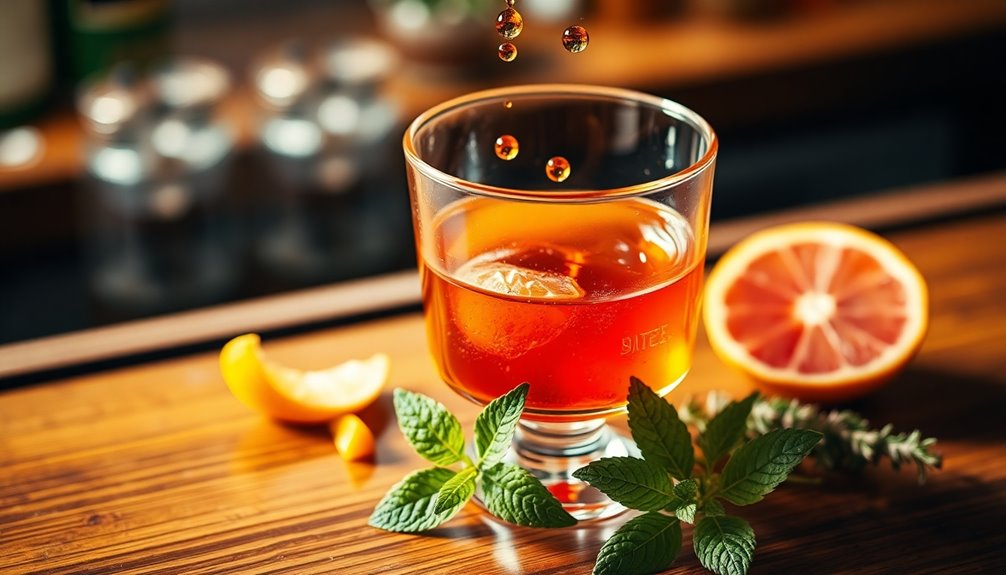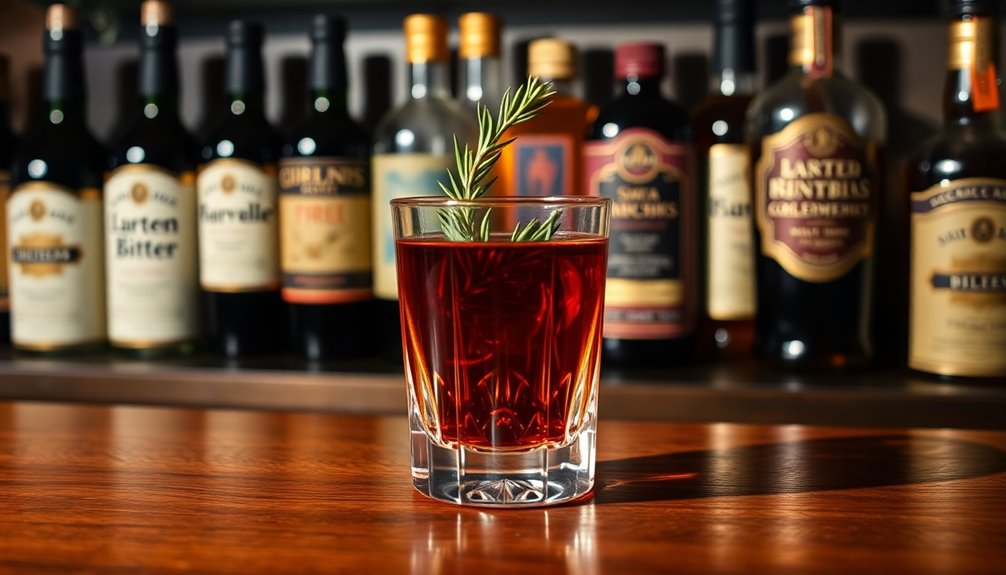You use aromatic bitters to enhance the flavor of various cocktails, like adding richness to an Old Fashioned or balancing a Manhattan with a few dashes. They're not just for drinks; bitters can transform non-alcoholic beverages, making mocktails and sparkling waters more complex. You can also incorporate them into cooking, adding depth to sauces, salad dressings, or even desserts. Plus, bitters support digestion and may promote liver health. With their versatility, you'll find endless ways to experiment and elevate your culinary and cocktail creations. Discovering the right bitters for your needs could reveal even more possibilities.
Key Takeaways
- Aromatic bitters are primarily used to enhance cocktails, adding depth and complexity to drinks like the Old Fashioned and Manhattan.
- They can improve non-alcoholic beverages such as sparkling water, tonic water, and mocktails by adding intriguing flavors.
- Bitters support digestion and promote liver health, thanks to ingredients like dandelion root and holy basil.
- In culinary applications, bitters can enhance soups, salad dressings, marinades, and desserts by balancing sweetness and adding flavor complexity.
- Store bitters in a cool, dark place for indefinite shelf life, and start with small amounts to gauge flavor impact.
Understanding Aromatic Bitters

Aromatic bitters are more than just a cocktail ingredient; they're a key element that transforms your drinks into flavorful experiences.
When you mix aromatic bitters, like Angostura or Peychaud's, with classic cocktails such as the Old Fashioned, you dramatically enhance their flavor profile. These bitters, crafted from a blend of dried fruits, spices, and herbs, add depth and complexity that elevate your drink. A simple dash or two—typically 4-6 per drink—integrates beautifully, ensuring a balanced taste.
You can even use aromatic bitters in non-alcoholic beverages, like sparkling water, to create invigorating options. With their infinite shelf life, aromatic bitters remain a versatile staple for cocktail enthusiasts, enhancing a variety of beverages over time.
Key Ingredients in Aromatic Bitters

The flavor of aromatic bitters comes from a unique blend of key ingredients that work together to create their signature taste.
You'll often find dried Bing cherries, fresh ginger, and a mix of warm baking spices like cinnamon and nutmeg. Traditional components such as gentian, quassia, and wild cherry bark add to the bitters' complex flavor profile and their medicinal benefits.
Non-traditional ingredients like grains of paradise and anise can also enhance the aromatic complexity. This careful selection of ingredients is essential in crafting bitters that serve as a spice rack for drinks, elevating the overall taste and balance in classic cocktails, including favorites like the Old Fashioned and Manhattan.
Enjoy experimenting with these flavors!
Classic Cocktail Applications

When you mix classic cocktails, aromatic bitters are a game changer.
In an Old Fashioned, they add rich depth, while in a Manhattan, they enhance the sweet vermouth and whiskey balance.
A few dashes can transform your drink, making it truly memorable.
Old Fashioned Variations
Although the Old Fashioned is a timeless classic, you can easily adapt it to suit your taste by experimenting with various spirits and ingredients.
Here are some fun variations to try:
- Rum Old Fashioned: Swap whiskey for aged rum while keeping the aromatic bitters to maintain depth.
- Brandy Old Fashioned: Use brandy for a smoother, sweeter profile, enhancing the drink's richness.
- Citrus Twist: Add a splash of fresh orange juice or orange peel to brighten the flavors.
- Cherry Infusion: Muddle a cherry with sugar before adding bitters for a fruity touch.
Manhattan Enhancements
While crafting a Manhattan, enhancing its character is as simple as adding a few dashes of aromatic bitters. These bitters elevate the drink, infusing it with depth and complexity. Typically, you'll want to add 2-3 dashes of Angostura bitters to your whiskey and sweet vermouth mixture. This classic combination creates a balanced flavor profile that harmonizes the whiskey's warmth with the vermouth's sweetness.
| Bitters Type | Flavor Notes | Recommended Amount |
|---|---|---|
| Angostura | Cinnamon, nutmeg, clove | 2-3 dashes |
| Regans' Orange | Orange zest, spices | 2 dashes |
| Peychaud's | Anise, cherry | 2 dashes |
| Fee Brothers | Aromatic herbs, spices | 2 dashes |
| Bittermens | Various unique flavors | 2-3 dashes |
With bitters, your Manhattan transforms into a sophisticated cocktail.
Enhancing Non-Alcoholic Beverages
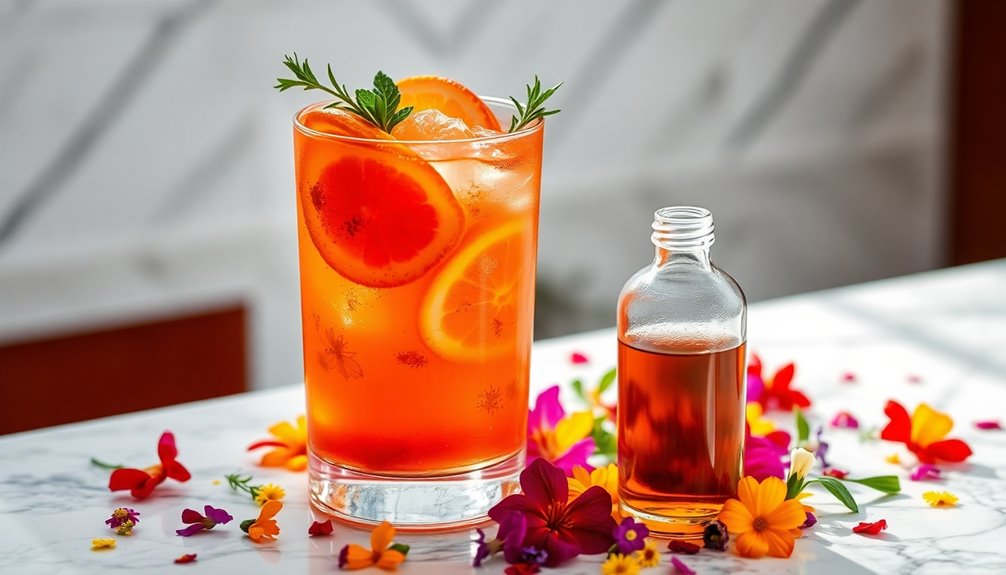
If you're looking to elevate your non-alcoholic drinks, incorporating aromatic bitters is a game changer.
These flavorful elixirs add depth and complexity, making your beverages truly invigorating.
Here are some ideas to enhance your non-alcoholic options:
- Bitters and Soda: Mix a few dashes with sparkling water for a light, bubbly treat.
- Non-Alcoholic Tonic: Add bitters to tonic water for a sophisticated twist.
- Fruit Juices: Balance the sweetness of orange or grapefruit juice with aromatic bitters for a flavorful mocktail.
- Herbal Teas: Enhance your favorite herbal tea with a dash of bitters for an aromatic experience.
With these simple additions, your non-alcoholic beverages will feel more crafted and unique!
Culinary Uses Beyond Cocktails
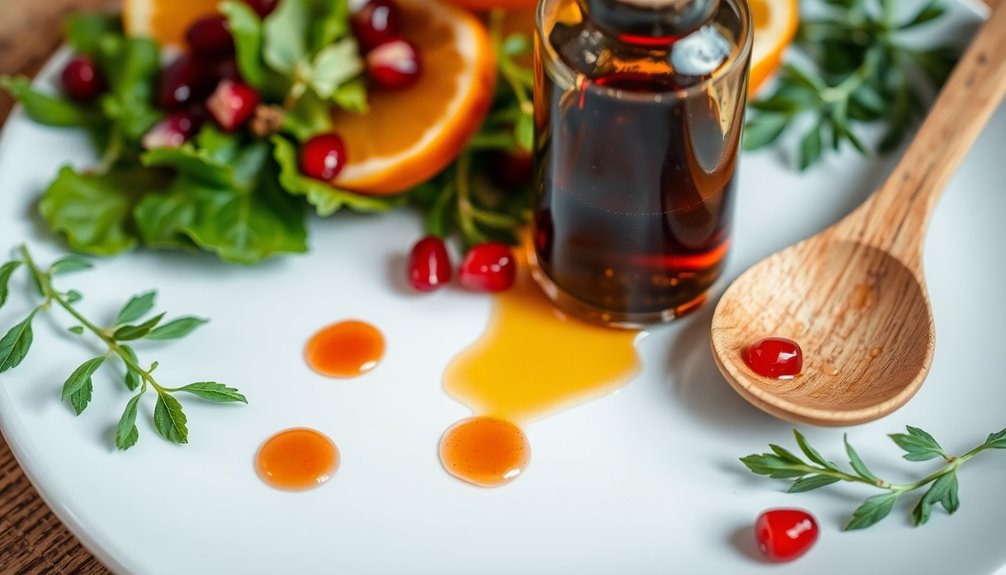
Aromatic bitters aren't just for cocktails; they can transform your culinary creations as well. Bitters provide depth and complexity to savory dishes, enhancing flavors in a way that's similar to how they work in drinks.
Use them at the beginning of cooking, mixing with fresh herbs and spices like lime zest and scallions for a harmonious base. Just a few dashes can elevate soups and vinaigrettes, creating a balanced flavor profile without overpowering bitterness.
Bitters are perfect for marinades and sauces, adding a unique twist to grilled meats or roasted vegetables. Their versatility in culinary applications showcases how they bridge the gap between cooking and mixology, making every dish a bit more exciting.
Health Benefits of Bitters
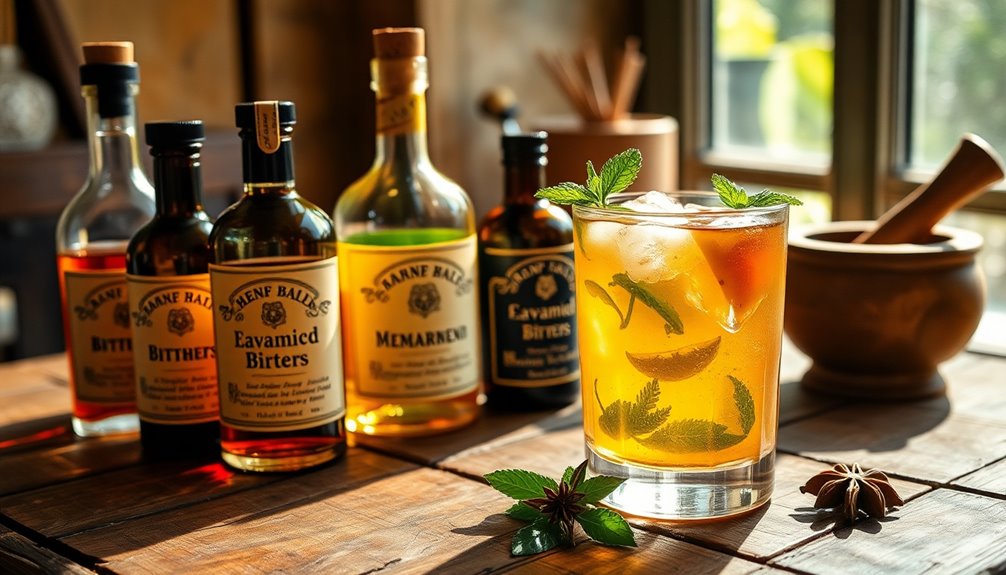
When you enjoy aromatic bitters, you're not just enhancing your drink; you're also tapping into their potential health benefits.
These bitters can support digestion and promote liver health, thanks to their natural herbal remedies.
Incorporating them into your routine might just give you a holistic boost toward overall well-being.
Digestive Support Properties
While many people enjoy the complex flavors of aromatic bitters in their cocktails, they also serve a significant purpose in promoting digestive health.
These bitters can help alleviate stomach aches and support digestion in several ways:
- Stimulate Appetite: Bitters, particularly those with dandelion root, can enhance your desire to eat.
- Enhance Digestive Enzymes: They may boost the production of enzymes critical for breaking down food.
- Promote Bile Production: The bitter compounds assist in bile production, aiding fat digestion and nutrient absorption.
- Alleviate Bloating: Regular use can help reduce feelings of fullness and discomfort after meals.
Incorporating aromatic bitters into your drinks mightn't just elevate the flavor but also offer essential digestive support.
Liver Health Promotion
Bitters do more than just support digestion; they can also play a significant role in promoting liver health. Ingredients like milk thistle seed and dandelion root found in aromatic bitters are renowned for their detoxifying properties. Additionally, studies suggest that herbal extracts can enhance liver function by reducing oxidative stress.
By helping your body absorb nutrients more efficiently, these bitters can alleviate strain on your liver, enhancing overall digestive health. Historically, bitters have been used for their medicinal benefits, linking them closely to liver function.
Additionally, the adaptogenic properties of holy basil in bitters may further support liver health and overall wellness. Incorporating bitters into your routine can be beneficial for overall digestive health, as they stimulate the production of digestive enzymes.
Natural Herbal Remedies
Aromatic bitters offer a unique blend of natural herbal remedies that can enhance your overall wellness. By incorporating these herbal components into your routine, you might experience several health benefits:
- Supports Digestive Health: The botanicals and spices in bitters, like milk thistle and dandelion, can aid digestion.
- Stimulates Appetite: Consuming bitters before meals can boost your appetite and promote digestive enzyme production.
- Offers Holistic Benefits: Ingredients such as holy basil are linked to functional health advantages.
- Enhances Beverages: Their rich flavor profiles make aromatic bitters perfect for both alcoholic and non-alcoholic drinks, delivering enjoyment along with potential health benefits.
Incorporate bitters into your lifestyle, and enjoy the wellness perks they bring! Additionally, certain bitters may contain antioxidants that combat oxidative stress, which can further support your overall health.
Tips for Using Aromatic Bitters
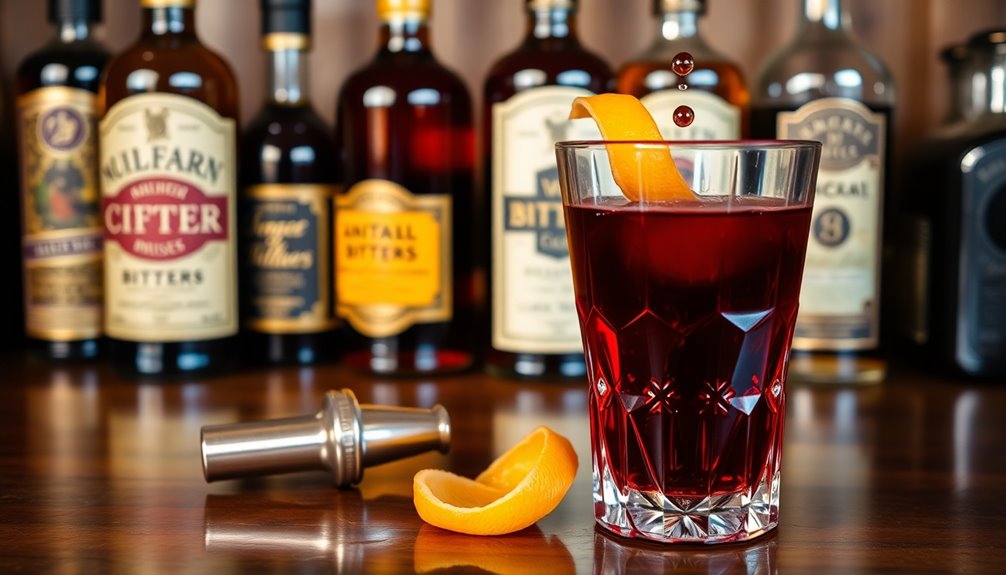
When you're looking to elevate your cocktails or culinary creations, incorporating aromatic bitters can make a significant difference.
Use 4-6 dashes of aromatic bitters in classic cocktails like the Old Fashioned or Manhattan to balance sweetness and bitterness, enhancing their overall flavor profile.
If you want a revitalizing non-alcoholic drink, try adding a few drops of bitters to sparkling water for a delightful bitters and soda. You can also deepen the taste of mixers like tonic or ginger beer with aromatic bitters.
Don't stop at drinks—add them to soups or vinaigrettes for a rich, unified flavor.
Finally, store your bitters in a cool, dark place; their shelf life is indefinite, and their flavor can evolve over time.
Frequently Asked Questions
What Drinks Do You Use Aromatic Bitters In?
You can use aromatic bitters in a variety of classic cocktails to enhance their flavor.
Try adding them to an Old Fashioned or a Manhattan for a richer taste. They also work well in a Sazerac, balancing the sweetness of sugar and the anise notes from absinthe.
For something lighter, a few dashes in an Americano or even sparkling water create an invigorating, flavorful drink.
Don't hesitate to experiment with your favorites!
Can You Drink Aromatic Bitters by Itself?
You really shouldn't drink aromatic bitters by themselves. Their intense flavor and high alcohol content can be overwhelming, making them more suitable as a cocktail ingredient.
If you're looking to enjoy their complexity, try mixing a few dashes into a drink instead. This way, you'll appreciate how they enhance flavors rather than feeling the brunt of their concentrated taste.
They're meant to complement other ingredients, creating a balanced experience.
What Is the Purpose of Drinking Bitters?
When you drink bitters, you're enhancing your beverage's flavor and complexity. They add depth to cocktails, making them more enjoyable.
You might also find bitters helpful for digestion, as their blend of botanicals can support your digestive health. A few dashes can elevate your sparkling water or soda, turning them into sophisticated drinks.
Plus, experimenting with bitters allows you to discover new flavor combinations, enriching your overall tasting experience.
When Should You Use Bitters?
You should use bitters whenever you want to elevate the flavor of your drinks or dishes. A few dashes can transform cocktails, adding depth and complexity that makes them more enjoyable.
Try them in non-alcoholic beverages for a sophisticated touch or incorporate them into sauces and marinades for enhanced richness. Since they're versatile and have an indefinite shelf life, you can experiment with bitters in various recipes anytime you're feeling creative.
Conclusion
So, whether you're crafting a classic cocktail or adding a dash of flavor to your favorite mocktail, aromatic bitters are your secret weapon. Picture a drop of liquid magic transforming your drink into a symphony of taste, where each sip dances on your palate. Don't forget their culinary charm, too—elevating dishes from ordinary to extraordinary. With their myriad uses, a bottle of bitters is like a treasure chest, waiting to reveal a world of flavor in your kitchen and bar.

